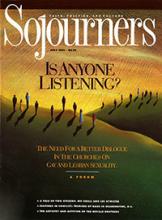"How can you be both gay and Christian?" How often living and thriving within the church, my chosen home, has seemed to depend on trying to provide other Christians with a satisfactory answer to that question. Instead of rejoicing in the commonality of faith and ministry that unites us, my spiritual energy has been drained in self-defeating efforts to justify my identity as a gay man as an acceptable -- let alone necessary and wonderful -- part of the Christian community.
It has been a deeply painful process. Claiming an identity as both gay and Christian raises questions about sexuality and spirituality that take us to the heart of what it means to be a faithful people of God. It forces us to ask soul-searching questions about how we understand the Bible and its role in the Christian life, what is and is not a natural part of God's created order, and how we interpret the traditional teachings of the church on sexuality.
It is also a sensitive process that already has polarized our churches and faith communities. For some, Christian and gay describe irreconcilable poles of a spectrum between holy and sinful, between what is acceptable to God and what is unacceptable and an abomination in God's sight. Homosexuality is seen as the epitome of spiritual afflictions that beset our times. Others accept the words of many lesbians and gay men that our homosexuality is less something we choose than discover about ourselves, attributing homosexuality to the fallenness of the world, but still within the realm of God's grace. Being homosexual is not sinful, we are told, but acting on it is.
Read the Full Article

